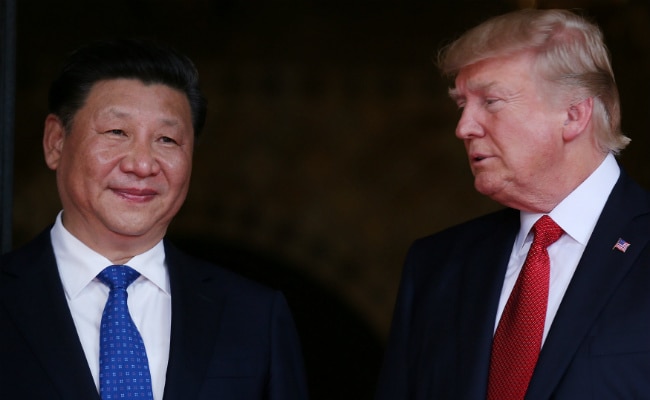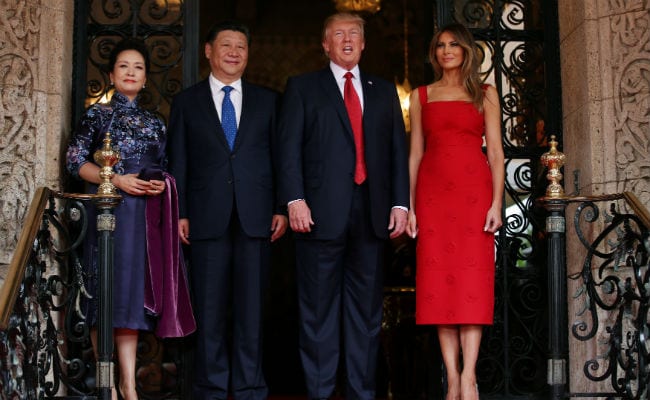
US President Donald Trump and Chinese President Xi Jinping met at Mar-a-Lago resort
Palm Beach, Florida:
US President Donald Trump and Chinese President Xi Jinping met face-to-face for the first time on Thursday, spending some social time together with their wives before digging in to the thorny trade and security issues that bedevil the relationship between the world's two largest economies. Trump said he wants to raise concerns about China's trade practices and urge Xi to do more to rein in North Korea's nuclear ambitions in the talks, though no major deals on either issue were expected.
Xi and his wife, Peng Liyuan, drove down a palm-lined driveway past a military honour guard to Trump's Spanish-style Mar-a-Lago resort in Palm Beach, Florida, welcomed by Trump and his wife Melania before going inside.
 The couples posed for pictures sitting on sofas in the resort's formal living room. They were set to dine in a candle-lit ornate private dining room at 6:30 pm (2230 GMT) at a long table set for about 30 people and festooned with red and yellow floral centrepieces.
The couples posed for pictures sitting on sofas in the resort's formal living room. They were set to dine in a candle-lit ornate private dining room at 6:30 pm (2230 GMT) at a long table set for about 30 people and festooned with red and yellow floral centrepieces.
They were expected to get into more detailed discussions about trade and foreign policy issues on Friday, concluding their summit with a working lunch.
Trump promised during the 2016 presidential campaign to stop what he called the theft of American jobs by China and rebuild the country's manufacturing base. Many blue-collar workers helped propel him to his unexpected election victory on November 8 and Trump wants to deliver for them.
"We have been treated unfairly and have made terrible trade deals with China for many, many years. That's one of the things we are going to be talking about," Trump told reporters travelling with him on Air Force One.
Trump, a former real estate magnate, is still finding his footing in the White House and has yet to spell out a strategy for what his advisers called a trade relationship based on "the principle of reciprocity."
He brought his top economic and national advisers to Florida for the meeting, including Defence Secretary Jim Mattis, Treasury Secretary Steve Mnuchin, and Commerce Secretary Wilbur Ross.
"Even as we share a desire to work together, the United States does recognise the challenges China can present to American interests," said Secretary of State Rex Tillerson, also in Florida for the meeting.
The dinner comes as Trump and his national security team face a completely different weighty foreign policy issue: how to respond to a deadly poison gas attack in Syria. A US official said the White House and Pentagon were discussing military options.
Differing Personalities
Their summit brings together two leaders who could not seem more different: the often stormy Trump, prone to angry tweets, and Xi, outwardly calm, measured and tightly scripted, with no known social media presence.
What worries the protocol-conscious Chinese more than policy clashes is the risk that the unpredictable Trump could publicly embarrass Xi, after several foreign leaders experienced awkward moments with the new US president.
"Ensuring President Xi does not lose face is a top priority for China," a Chinese official said.
US labour leaders say Trump needs to take a direct, unambiguous tone in his talks with Xi.
"President Trump needs to come away from the meeting with concrete deliverables that will restore production and employment here in the US in those sectors that have been ravaged by China's predatory and protectionist practices," said Holly Hart, legislative director for the United Steelworkers union.
A US administration official told Reuters that Washington expects to have to use legal tools to fight for US companies, such as pursuing World Trade Organisation lawsuits.
"I don't expect a grand bargain on trade. I think what you are going to see is that the president makes very clear to Xi and publicly what we expect on trade," a USofficial told Reuters, speaking on condition of anonymity.
Trump has often complained Beijing undervalues its currency to boost trade, but his administration looks unlikely to formally label China as a currency manipulator in the near term - a designation that could come with penalties.
North Korea A Test
The most urgent problem facing Trump and Xi is how to persuade nuclear-armed North Korea to halt unpredictable behaviour like missile test launches that have heightened tensions in South Korea and Japan.
North Korea is working to develop an intercontinental ballistic missile capable of hitting the United States.
The White House has said North Korea was a test for the US-China relationship, and Trump has threatened to use trade to try to force China to exert influence over Pyongyang.
"I think China will be stepping up," Trump told reporters. Beijing says its influence is limited and that it is doing all it can but that it is up to the United States to find a way back to talks with North Korea.
Trump consulted on Wednesday with Japanese Prime Minister Shinzo Abe, who said he and the president agreed by phone that North Korea's latest ballistic missile launch was "a dangerous provocation and a serious threat."
A White House strategy review is focussing on options for pressuring Pyongyang economically and militarily. Among measures under consideration are "secondary sanctions" against Chinese banks and firms that do the most business with Pyongyang.
A long-standing option of pre-emptive strikes remains on the table, but despite the tougher recent US talk, the internal review "de-emphasizes direct military action," the US official said, speaking on condition of anonymity.
Analysts believe any military action would likely provoke severe North Korean retaliation and massive casualties in South Korea and Japan and among US troops stationed there.
(Additional reporting by David Brunnstrom, Matt Spetalnick, Roberta Rampton, Ayesha Rascoe and Mohammad Zargham in Washington, Gui Qing Koh in New York, Ben Blanchard in Beijing and William Mallard in Tokyo; Editing by Lisa Shumaker and James Dalgleish)
Xi and his wife, Peng Liyuan, drove down a palm-lined driveway past a military honour guard to Trump's Spanish-style Mar-a-Lago resort in Palm Beach, Florida, welcomed by Trump and his wife Melania before going inside.

Donald Trump and First Lady Melania Trump welcome Chinese President Xi Jinping and first lady Peng Liyuan
They were expected to get into more detailed discussions about trade and foreign policy issues on Friday, concluding their summit with a working lunch.
Trump promised during the 2016 presidential campaign to stop what he called the theft of American jobs by China and rebuild the country's manufacturing base. Many blue-collar workers helped propel him to his unexpected election victory on November 8 and Trump wants to deliver for them.
"We have been treated unfairly and have made terrible trade deals with China for many, many years. That's one of the things we are going to be talking about," Trump told reporters travelling with him on Air Force One.
Trump, a former real estate magnate, is still finding his footing in the White House and has yet to spell out a strategy for what his advisers called a trade relationship based on "the principle of reciprocity."
He brought his top economic and national advisers to Florida for the meeting, including Defence Secretary Jim Mattis, Treasury Secretary Steve Mnuchin, and Commerce Secretary Wilbur Ross.
"Even as we share a desire to work together, the United States does recognise the challenges China can present to American interests," said Secretary of State Rex Tillerson, also in Florida for the meeting.
The dinner comes as Trump and his national security team face a completely different weighty foreign policy issue: how to respond to a deadly poison gas attack in Syria. A US official said the White House and Pentagon were discussing military options.
Differing Personalities
Their summit brings together two leaders who could not seem more different: the often stormy Trump, prone to angry tweets, and Xi, outwardly calm, measured and tightly scripted, with no known social media presence.
What worries the protocol-conscious Chinese more than policy clashes is the risk that the unpredictable Trump could publicly embarrass Xi, after several foreign leaders experienced awkward moments with the new US president.
"Ensuring President Xi does not lose face is a top priority for China," a Chinese official said.
US labour leaders say Trump needs to take a direct, unambiguous tone in his talks with Xi.
"President Trump needs to come away from the meeting with concrete deliverables that will restore production and employment here in the US in those sectors that have been ravaged by China's predatory and protectionist practices," said Holly Hart, legislative director for the United Steelworkers union.
A US administration official told Reuters that Washington expects to have to use legal tools to fight for US companies, such as pursuing World Trade Organisation lawsuits.
"I don't expect a grand bargain on trade. I think what you are going to see is that the president makes very clear to Xi and publicly what we expect on trade," a USofficial told Reuters, speaking on condition of anonymity.
Trump has often complained Beijing undervalues its currency to boost trade, but his administration looks unlikely to formally label China as a currency manipulator in the near term - a designation that could come with penalties.
North Korea A Test
The most urgent problem facing Trump and Xi is how to persuade nuclear-armed North Korea to halt unpredictable behaviour like missile test launches that have heightened tensions in South Korea and Japan.
North Korea is working to develop an intercontinental ballistic missile capable of hitting the United States.
The White House has said North Korea was a test for the US-China relationship, and Trump has threatened to use trade to try to force China to exert influence over Pyongyang.
"I think China will be stepping up," Trump told reporters. Beijing says its influence is limited and that it is doing all it can but that it is up to the United States to find a way back to talks with North Korea.
Trump consulted on Wednesday with Japanese Prime Minister Shinzo Abe, who said he and the president agreed by phone that North Korea's latest ballistic missile launch was "a dangerous provocation and a serious threat."
A White House strategy review is focussing on options for pressuring Pyongyang economically and militarily. Among measures under consideration are "secondary sanctions" against Chinese banks and firms that do the most business with Pyongyang.
A long-standing option of pre-emptive strikes remains on the table, but despite the tougher recent US talk, the internal review "de-emphasizes direct military action," the US official said, speaking on condition of anonymity.
Analysts believe any military action would likely provoke severe North Korean retaliation and massive casualties in South Korea and Japan and among US troops stationed there.
(Additional reporting by David Brunnstrom, Matt Spetalnick, Roberta Rampton, Ayesha Rascoe and Mohammad Zargham in Washington, Gui Qing Koh in New York, Ben Blanchard in Beijing and William Mallard in Tokyo; Editing by Lisa Shumaker and James Dalgleish)
© Thomson Reuters 2017
Track Latest News Live on NDTV.com and get news updates from India and around the world

